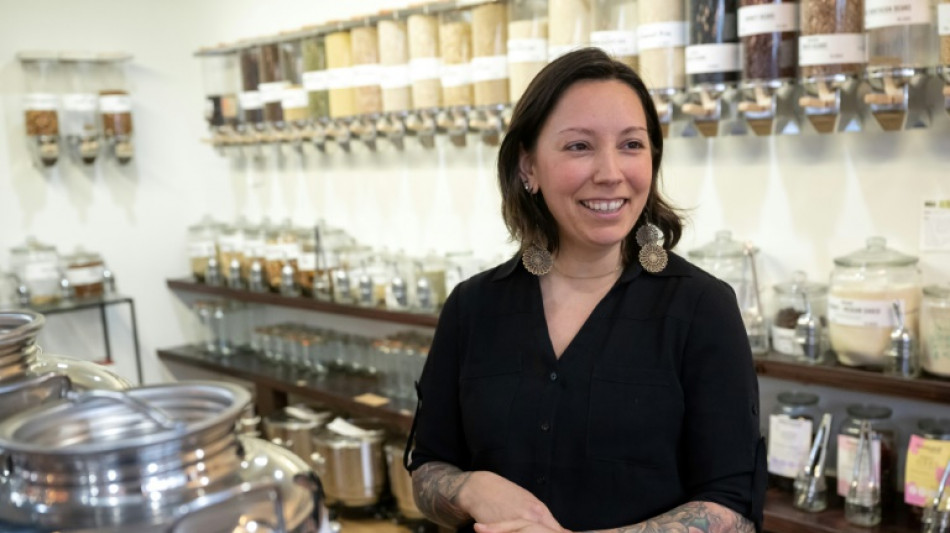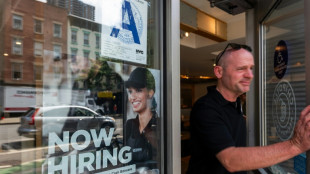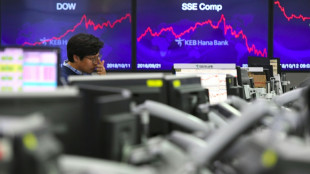
-
 Rybakina stays perfect at WTA Finals with win over alternate Alexandrova
Rybakina stays perfect at WTA Finals with win over alternate Alexandrova
-
Le Garrec welcomes Dupont help in training for Springboks showdown

-
 Brussels wants high-speed rail linking EU capitals by 2040
Brussels wants high-speed rail linking EU capitals by 2040
-
Swiss business chiefs met Trump on tariffs: Bern

-
 At least 9 dead after cargo plane crashes near Louisville airport
At least 9 dead after cargo plane crashes near Louisville airport
-
France moves to suspend Shein website as first store opens in Paris

-
 Spain's exiled king recounts history, scandals in wistful memoir
Spain's exiled king recounts history, scandals in wistful memoir
-
Wall Street stocks steady after positive jobs data

-
 Trump blasts Democrats as government shutdown becomes longest ever
Trump blasts Democrats as government shutdown becomes longest ever
-
Indian pilgrims find 'warm welcome' in Pakistan despite tensions

-
 Inter and AC Milan complete purchase of San Siro
Inter and AC Milan complete purchase of San Siro
-
Swedish authorities inspect worksite conditions at steel startup Stegra

-
 Keys withdraws from WTA Finals with illness
Keys withdraws from WTA Finals with illness
-
Prince Harry says proud to be British despite new life in US

-
 BMW boosts profitability, welcomes Nexperia signals
BMW boosts profitability, welcomes Nexperia signals
-
EU strikes last-ditch deal on climate targets as COP30 looms

-
 Stocks retreat as tech bubble fears grow
Stocks retreat as tech bubble fears grow
-
Shein opens first permanent store amid heavy police presence

-
 West Indies edge New Zealand despite Santner brilliance
West Indies edge New Zealand despite Santner brilliance
-
French pair released by Iran await return home

-
 German factory orders up but outlook still muted
German factory orders up but outlook still muted
-
Death toll tops 100 as Philippines digs out after typhoon

-
 Attack on key city in Sudan's Kordofan region kills 40: UN
Attack on key city in Sudan's Kordofan region kills 40: UN
-
'No one could stop it': Sudanese describe mass rapes while fleeing El-Fasher

-
 Champagne and cheers across New York as Mamdani soars to victory
Champagne and cheers across New York as Mamdani soars to victory
-
Medieval tower collapse adds to Italy's workplace toll

-
 BMW boosts profitability despite China, tariff woes
BMW boosts profitability despite China, tariff woes
-
South Africa's Wiese wary of 'hurt' France before re-match

-
 Asian markets sink as tech bubble fears grow
Asian markets sink as tech bubble fears grow
-
Beyond limits: Croatian freediver's breathtaking record

-
 Tottenham supporting Udogie after alleged gun threat in London
Tottenham supporting Udogie after alleged gun threat in London
-
Thunder roll Clippers to stay unbeaten as SGA keeps streak alive

-
 In appeal, Australian mushroom murderer alleges 'miscarriage of justice'
In appeal, Australian mushroom murderer alleges 'miscarriage of justice'
-
Toyota hikes profit forecasts 'despite US tariffs'

-
 Typhoon death toll soars past 90 in the Philippines
Typhoon death toll soars past 90 in the Philippines
-
Ex-France lock Willemse challenges Meafou to become 'the bully'

-
 Ukrainians to honour sporting dead by building country they 'died for': minister
Ukrainians to honour sporting dead by building country they 'died for': minister
-
At least 7 dead after UPS cargo plane crashes near Louisville airport

-
 US Supreme Court hears challenge to Trump tariff powers
US Supreme Court hears challenge to Trump tariff powers
-
US government shutdown becomes longest in history

-
 India's Modi readies bellwether poll in poorest state
India's Modi readies bellwether poll in poorest state
-
Green goals versus growth needs: India's climate scorecard

-
 Where things stand on China-US trade after Trump and Xi talk
Where things stand on China-US trade after Trump and Xi talk
-
Sri Lanka targets big fish in anti-corruption push

-
 NY elects leftist mayor on big election night for Democrats
NY elects leftist mayor on big election night for Democrats
-
Injured Jordie Barrett to miss rest of All Blacks tour

-
 Asian markets tumble as tech bubble fears grow
Asian markets tumble as tech bubble fears grow
-
Pay to protect: Brazil pitches new forest fund at COP30

-
 Australia pick 'impressive' Weatherald in first Ashes Test squad
Australia pick 'impressive' Weatherald in first Ashes Test squad
-
Iraq's social media mercenaries dying for Russia


Toothpaste tablets and syrup on tap: US refill shops cut the container
Toothpaste tabs plunk into a jar. Maple syrup flows viscously from a spout. Dishwasher powder crunches under the tip of a metal scoop. The chorus of consumer goods lacks one familiar sound: the crinkle of plastic wrap.
At Mason & Greens in Washington, the lack of packaging is the point -- the small shop selling household goods and groceries is among dozens of zero-waste refill stores sprouting up in US cities from Brooklyn to Los Angeles.
Customers bring their own containers -- from used jars to Tupperware, to fill with bulk items. The store even has "had people bring in the sleeves that their newspapers come in," owner Anna Marino, 34, told AFP.
Such stores are emblematic of what experts say is a necessary culture shift in one of the world's largest consumer economies, where the average person generates 4.9 pounds of waste per day, according to government statistics.
Marino says the aim is to help anyone from novices to experts on their journey towards less waste, citing paper towels as a personal catalyst.
"Quitting paper towels was one of the first things that my family did and it was a significant reduction in the waste that we were creating on a weekly basis," said Marino, who co-founded the store with her husband.
Reusable "paper" towels made of cloth are just one of the products she now sells at her store, where beans and oats fill wall-mounted dispensers, metal containers hold vinegar and olive oil, and shelves are stocked with package-free artisanal bread, veggies and vegan food.
For bulk items, customers pay by weight, Marino's aim being to avoid any "obnoxiously outrageous price" and to keep things "accessible."
Reusable containers, such as mason jars, can be purchased if needed.
Upstairs, shampoo bars and toothpaste tablets that are chewed until becoming paste are among the store's many unpackaged hygiene products.
Less than a third of US municipal solid waste was recovered for recycling or composting in 2018, according to the Environmental Protection Agency, and only about nine percent of plastic material was recycled.
Statistics such as these are why Marino asks suppliers to send shipments in compostable, or minimal packaging.
- 'Reduce, reuse' first -
"We can't recycle our way out of the plastics crisis," says Jenny Gitlitz of the advocacy group Beyond Plastics.
She points to toxins in plastic that can be carcinogenic or cause genetic mutations, as well as to endocrine disruptors.
On top of that, tiny particles called microplastics have been discovered in virtually every environment, from the Mariana Trench to Mount Everest, as well as in the human body including the lungs and blood.
Unlike aluminum and glass, plastic can only be recycled a few times before its polymers break down. And many types are not widely recyclable in the first place.
"If all else fails, then recycle," sums up professor Shelie Miller at the School for Environment and Sustainability at the University of Michigan.
"I think folks often skip straight to the recycle and forget to reduce, reuse," she told AFP.
Miller cautions that the issue of plastic waste will not be solved simply by individuals changing the way they consume -- as exemplified in places like Mason & Greens.
Creating a sustainable future "really is a complete shared responsibility model" involving corporations, governments and waste handlers, she said.
- 'No choice' -
In the meantime, though, Rini Saha -- the co-owner of the FullFillery, another Washington-area refill shop in the suburb of Takoma Park, Maryland -- hopes to make a difference from the ground up.
"We want you to reuse as much as we can, because recycling is still a huge carbon footprint," the 46-year-old told AFP.
Saha and colleagues make a number of body care and cleaning products on-site, for refill or purchase in a returnable container.
On a recent Wednesday morning, fellow co-owner Emoke Gaidosch, a chemist by training, poured liquid soap she had made into a large receptacle.
Aside from the lack of packaging, Miller says bulk sales could yield even bigger environmental benefits by helping consumers buy only what they need.
That, ultimately, can help eliminate the impacts from a product's entire lifecycle, from the energy and resources used to create it, to things like methane released when unused organic waste decays in landfalls.
Over three years of existence, the FullFillery has morphed from a farmer's market stall to a large store lined with environmentally friendly products and extremely limited packaging.
Similarly, Mason & Greens' Washington location, which only opened in September, was an expansion after the success of its first location in another suburb.
The model "is profitable," Saha told AFP. "I don't think it's as profitable as a disposable business."
"But I think that inevitably, there's no choice. This is the way that business has to go."
C.Hamad--SF-PST



